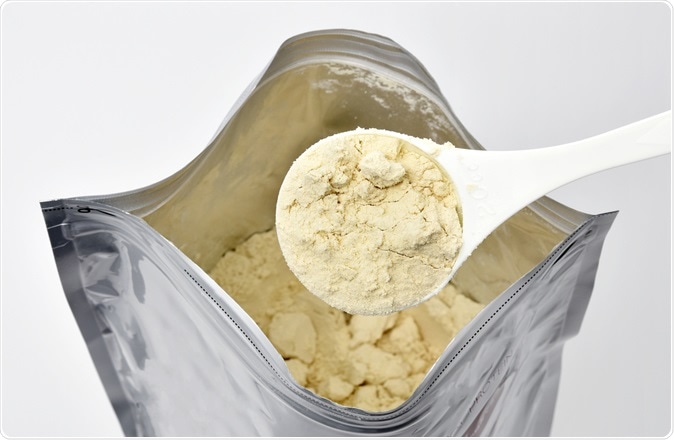Yesterday (30th October 2017), Susan Mayne,Ph.D. and director of the FDA’s Center for Food Safety and Applied Nutrition, issued a statement on behalf of the United States Food and Drug Administration (FDA) stating that the claims made by earlier studies that soy protein can reduce the risk of heart disease is not true.

Soy protein. Image Credit: Imagepocket / Shutterstock
She began the statement saying that the FDA is responsible for validating and debunking claims that certain food products and medicines may reduce the risk of certain diseases or condition. Since the 19190’s the FDA evaluates these claims based on scientific evidence and studies and on the basis of “strong science” authorizes the health claims on packaged food items. She stated that till date the FDA has authorized a dozen such claims. Some of the notable of these include reduction of risk of cancer with increased consumption of fruits and vegetables and use of calcium and Vitamin D to prevent the onset of osteoporosis etc.
In this new statement, she explained, a similar health claim is being revoked. Soy proteins have been claimed to reduce the risk of heart disease. This statement revokes that claim as it is deemed that the health claim is not based upon robust scientific evidence. She added that this was the first time that the FDA was revoking such a health claim. This health claim was authorized by the same organization in 1999 she said. She said that since then there has been a thorough evaluation that has shown that the relationship between soy protein and heart disease is inconsistent. Not all studies have successfully provided results where soy protein protects the heart on regular consumption. There have been FDA reviews and meets wherein the experts have come to the conclusion that such a claim needs to be revoked as it is not true and misguiding to the general public she said. The purpose of these authorizations is for the public to make informed dietary choices she said.
The statement adds that there is still some scientific evidence that shows that there might be a relationship between consumption of soy protein and reduction of heart disease risk. These were present when FDA had authorized the claim the soy proteins are protective. However several studies published after the claim was authorized show inconsistent results. These studies have especially studied if consuming soy proteins can lower the low-density lipoprotein (LDL) cholesterol or the bad cholesterol that damages the heart. Taking into consideration all of these studies and evidence the panel of experts believe that soy protein does not meet the standards for FDA to continue to endorse it as protective against heart disease.
However, the FDA may still allow the use of a “quantified health claim”. This is a special kind of approval, Mayne explained, where lower standards of evidence of the protective nature of a food are acceptable. Under this “quantified health claim” the industry would be allowed to use language that is less definitive. They would still be able to say that soy protein can protect an individual from heart disease but word it differently and less confidently so that consumers can make informed dietary choices.
Mayne went on to say that the FDA would work closely with the stakeholders and other interested parties. A comment period is opened up for 75 days. Within this the comments and existing evidence would be reviewed for a final rule making decision. Until this final decision is made, the manufacturers would be able to keep the current claims on their labels.
The American Heart Association has earlier advised the FDA to revoke the health claim of soy proteins. The AHA had earlier in 2008 said, “Direct cardiovascular health benefit of soy protein or isoflavone supplements is minimal at best.”
The statement ended with consumers to follow dietary advice that is presented in the 2015-2020 Dietary Guidelines.